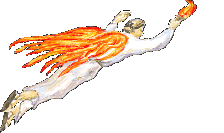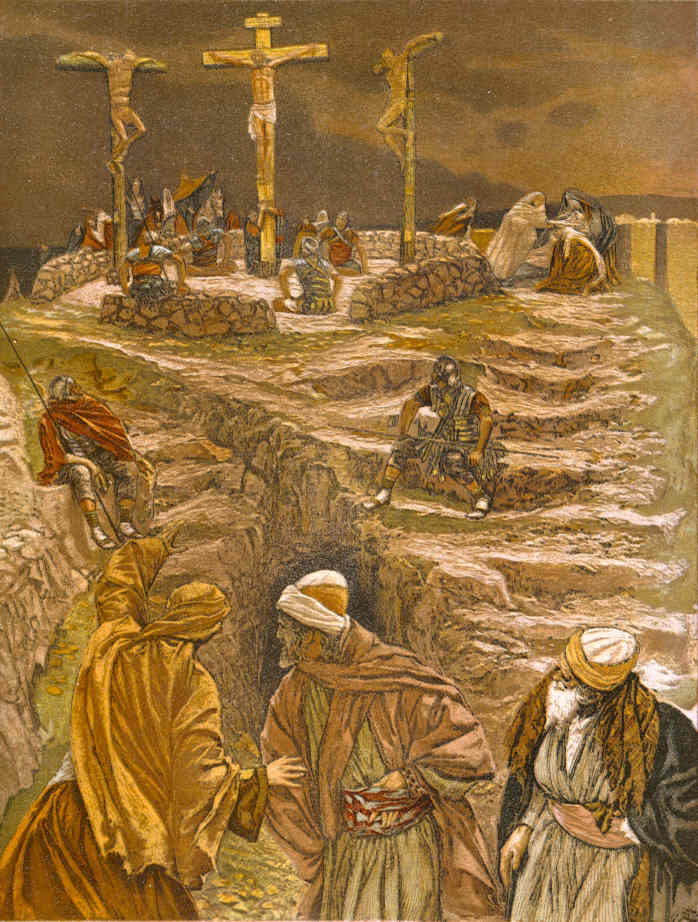|
Some interpreters hear Him speaking corporately, on behalf of the
members who will comprise His body, or even those whom He would have
wished to make up the number. In other words the 'god-forsakenness' is
not His own, but that of those for whom He died, who will not take the
proffered salvation:
“. . .that the complaint of Jesus Christ to His Father
proceeded from the sentiment with which He was affected, in
representing to Himself the little fruit which His death would
produce; in considering the small number of the elect who would
profit by it; in foreseeing with horror the infinite number of the
reprobate, for whom it would be useless: as if He had wished to
proclaim that His merits were not fully enough, nor worthily enough,
remunerated; and that after having done so much work, He had a right
to promise to Himself a different success in behalf of men. . .That
millions of the human race for whom He suffers will nevertheless
be excluded from the benefit of redemption. And because He
regards Himself in them as their Head, and themselves, in spite
of their worthlessness, as the members of His mystical body,
seeing them abandoned by God, He complains of being abandoned
Himself: 'My God, my God, why hast Thou forsaken Me!'”
(Louis Bourdaloue, Sermon on the Passion of Jesus Christ, Luther,
Martin; Calvin, John; Knox, John; Latimer, Hugh; Zwingli, Huldreich;
FenÚlon, Francois (2017-03-12). The Great Orators of the Reformation
Era (Kindle Locations 2802-2810). Gideon House Books).
This view, however, cannot really be correct, because the lost
are not 'in Christ.' Nevertheless, whatever the nature of His distress, it is real. There shouldn't
be any need to stress this point, but if it didn't happen, then the prophecy is unfulfilled! How often do we
hear this type of thing, "Changing the order and wording of such
episodes usually reflects a distinctive understanding of Jesus's life,
teachings, and death on the part of a Gospel author who was far more
interested in the theological significance carried by the story than in
historical accuracy." (L. Michael White, From Jesus to Christ, p. 116).
If there is no "historical accuracy," then there is no "theological
significance!" The "theological significance" of things which were
prophesied but never happened is exactly nil. We still await the
fulfillment of some things. The God who authored scripture is also the God
who rules history; He does not prophesy of things that don't occur.
There is plainly a distinction drawn in these verses; as the
heretics perceive, "Do you really believe that when Jesus was on the
cross, He must have meant, 'Myself, myself, why have I forsaken
myself?' instead of what is actually in Mark 15:34: ,My God, my God,
why have you forsaken me?'" (Gail Shamblin Lara,
Remnant Fellowship website, retrieved 5/30/22). To this diet
guru turned heretic, the cry of dereliction is sufficient proof that
Jesus cannot be God, as Christians confess. To be sure, there cannot
be more than one will in the Trinity, while there can be both a
human and a divine will in the incarnate Jesus Christ. Yet a
threatened estrangement looms within God's own lived experience, not
between 'natures' which have no such inter-relationship, but between persons.
While Jesus' recitation of this Psalm cements His claim to be the
awaited Messiah, His cry on the cross has paradoxically been used as an accusation
against Him by his bitterest enemies, such as Bart Ehrman. But in the meanwhile it has also
treasured by those He has redeemed, who understand the cost of their ransom.
"He ended his life with the words, 'Eli, Eli, lama
sabachthani?' 'My God, my God, why hast Thou forsaken me?'
— confession which can hardly be otherwise interpreted than
that God had not helped him to carry out his intention and
attain his object as he had hoped He would have done. It was
then clearly not the intention or the object of Jesus to suffer
and to die, but to build up a worldly kingdom, and to deliver
the Israelites from bondage. It was in this that God had
forsaken him, it was in this that his hopes had been
frustrated." (Reimarus, Fragments of Reimarus, Section VIII,
Kindle location 270).
This cry of dereliction is a camouflaged trap for unbelievers, almost all of whom will
eagerly admit that the Lord said those words, but in so admitting have
also conceded the Lord claimed to be the Messiah. Reimarus wants to make
of Him a failed Messiah,— he ". . .pretended to be a Messiah,"
(ibid. Kindle location 349),— but oddly enough those like Ehrman
who deem Him no Messiah at all willingly follow Reimarus' lead, the
suffering servant seeming an easy target; but the blows they land only
confirm His identity.

|







